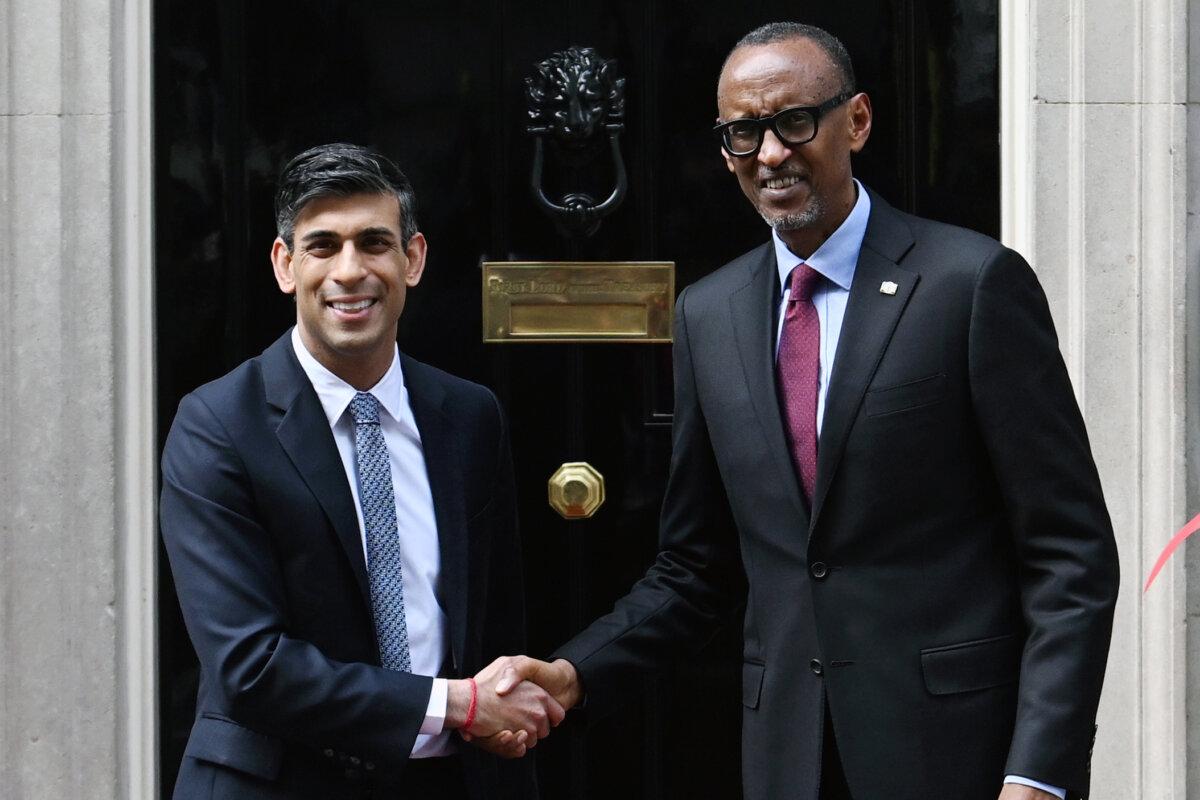Prime Minister Rishi Sunak is facing a formidable challenge from 70 MPs, including nearly 60 on the right of the Tory party and two former senior party officials, after the first of two days of exhaustive debates in the Commons over his proposal to send asylum seekers to Rwanda.
Approximately 60 MPs from within the Conservative Party challenged the prime minister on Tuesday by supporting amendments aimed at strengthening the proposed law on the Rwanda policy.
The critical juncture arrives on Wednesday as the entire bill undergoes the third reading vote in the Commons, a pivotal moment before it proceeds to the House of Lords for potential alterations.
If the government is defeated at this stage, the entire bill collapses, posing a significant setback for the prime minister and likely delaying the implementation of the Rwanda policy until after an election, an outcome contrary to the public aims of the rebellious MPs.
Mr. Sunak’s decision making process intensified on Tuesday after the incumbent deputy chairs of the Conservative Party, Lee Anderson and Brendan Clarke-Smith, joined the rebellion, before promptly announcing their resignations from those party positions ahead of voting.
Amendments a ‘Final Opportunity’ as Rwanda Offers Compensation
During debates in the Commons on Tuesday, former Immigration Minister Robert Jenrick emphasised that his proposed amendments serve as the “final opportunity” to strengthen the Rwanda bill as an effective deterrent against small boat crossings.Urging Mr. Sunak to consider changes supported by Tory rebels, Mr. Jenrick suggested that acceptance should be straightforward unless the government’s objectives have shifted.
The MP for Newark highlighted that his amendments, in conjunction with those put forth by veteran Tory Sir Bill Cash, aim to rectify apparent shortcomings in the bill.
While ministers express confidence in securing victory during Wednesday’s vote, there remains uncertainty regarding the allegiance of the MPs who defied Mr. Sunak in the previous session. Some Conservative MPs, who voted for amendments to toughen the bill, have indicated they will rebel again if the government fails to consider their proposed changes.
The outcome of Wednesday’s vote holds substantial implications for the fate of the Rwanda policy and the prime minister’s standing.
Rwandan President Paul Kagame, speaking at the World Economic Forum meeting in Switzerland on Wednesday, stated that if no refugees are sent to Rwanda under the UK’s asylum plan, he is willing to return the money contributed by UK taxpayers.
In response to questions about the Supreme Court’s ruling on the safety of his country, Mr. Kagame told the BBC that any issues with the Rwanda plan are the “UK’s problem,” not Rwanda’s.

Government Branded Indecisive
Speaking to The Epoch Times on Monday, Sir Bill, who is chair of the European Scrutiny Committee, said that the government had “a difficulty with indecision, some bad advisers, and also bad lawyers.”Representing the constituency of Stone, Sir Bill on Wednesday expressed his desire for the bill’s success and functionality, acknowledging its current inadequacies.
Speaking alongside Sir Bill in the Commons, doubts were raised on Tuesday by former minister Sir John Redwood regarding the prime minister’s plan to enlist around 150 judges and optimise courtrooms for handling migrant appeals.
Mr. Johnson’s intervention further complicates Mr. Sunak’s position, as Downing Street maintains a stance of rejecting any amendments without legal proof from the rebels that their changes won’t breach international law. The pressure to emerge from this conflict unscathed poses a serious challenge to the current administration, with parliamentary loyalists of Mr. Johnson’s still holding a grudge about Mr. Sunak’s appointment to Number 10.
Tensions have risen further with anonymous Tory donors funding a YouGov “mega poll,” revealing that 42 percent of adults support the immediate removal of individuals crossing the Channel in small boats with no right of appeal.
Leigh Warns of ‘Manufactured Opposition’
Senior Tory MP Sir Edward Leigh, who has led the rebellion alongside figures like Sir Bill and Sir John Hayes, threw his support behind the amendments proposed by Mr. Jenrick to strengthen the bill. Simultaneously, he introduced two amendments of his own, aimed to prevent individuals from arguing that it was unsafe to be sent to Rwanda if they intentionally took actions to make the country unsafe for themselves.Using an example involving the fabrication of opposition to the Rwandan regime, he said: “It’s so simple. You can manufacture some spurious opposition to the Rwandan regime. You could do a tweet—even I could do a tweet—you can do a tweet in five minutes saying that the president of Rwanda is a dictator, or that he should be overthrown, and you’ve done it.”
Tory Election Chief Warns Against Division
Conservative election campaign chief Isaac Levido emphasised party unity during a meeting on Monday with the 1922 Committee, warning that it was “time to get serious” and that “divided parties fail.”While Mr. Anderson and Mr. Clarke-Smith, senior Tory party officials, are not bound by ministerial rules of collective responsibility, Downing Street aims to maintain strong party cohesion ahead of the political tightrope of a general election.
The U.N. High Commissioner for Refugees added a new layer of international pressure today to Mr. Sunak’s plan, with an assessment stating that the proposal fails to meet required standards regarding the legality and appropriateness of transferring asylum seekers, thus being incompatible with international refugee law.
Despite Mr. Sunak’s insistence that his unamended plan complies with international law, the prime minister on Wednesday cautioned rebels against any attempts to toughen the bill, as it could jeopardise Rwanda’s cooperation.







